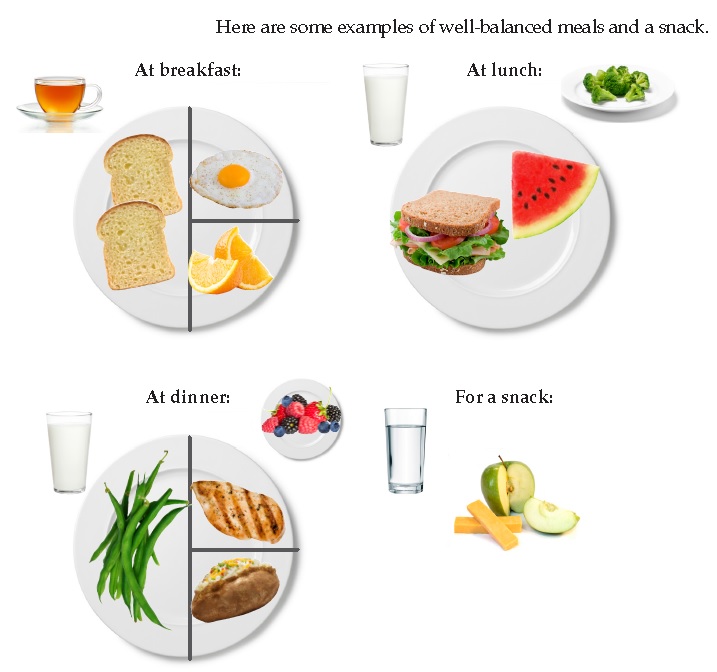
According to the United States Department of Agriculture, you should:
- eat smaller portion sizes
- make half of your grains whole
- make half of your plate vegetables and fruits
- drink fat-free or low-fat milk
- eat lean proteins
Visit choosemyplate.gov for more information about nutrition.
Be sure to drink six to eight 8-ounce glasses of liquids (especially water) each day.
Eat foods high in vitamin C to help absorb the iron that comes from plants such as spinach.
For instance, drink a glass of orange juice with an iron-fortified cereal.
Good sources of vitamin C are oranges, broccoli, tomatoes, kiwi, strawberries, peppers, potatoes and cabbage.
Nutrition: What you need to know
Good nutrition is essential for your recovery. Eating well-balanced meals and snacks will help you recover quickly and help you feel your best. What you eat affects your well-being.
If you do not eat enough of the right foods, you will become tired and less able to take care of yourself. Be sure you make time to eat—even if you do not feel hungry.
When you are planning your meals and snacks, try to think about what your plate should look like.


According to the United States Department of Agriculture, you should:
- eat smaller portion sizes
- make half of your grains whole
- make half of your plate vegetables and fruits
- drink fat-free or low-fat milk
- eat lean proteins
Visit choosemyplate.gov for more information about nutrition.
Be sure to drink six to eight 8-ounce glasses of liquids (especially water) each day.
Eat foods high in vitamin C to help absorb the iron that comes from plants such as spinach.
For instance, drink a glass of orange juice with an iron-fortified cereal.
Good sources of vitamin C are oranges, broccoli, tomatoes, kiwi, strawberries, peppers, potatoes and cabbage.
Nutrients important for your recovery
Eating foods rich in the following nutrients are important for your recovery.
- Protein:
Protein helps repair and build healthy tissue. - Iron:
Iron works in each of your body’s cells to help make energy. - Vitamin C:
Vitamin C helps your body repair damaged tissues, keeps your bones and teeth strong, and helps your body absorb iron. - Calcium:
Calcium helps build and maintain your bones, your muscles move, your blood clot and your nerves send messages. - Fiber:
Fiber helps your body produce regular bowel movements.
Use the healthful foods chart to help you choose foods for building well-balanced meals and snacks.
Ask your health care provider if you have questions about your nutrition and recovery.
Related resources